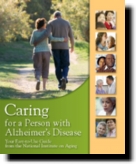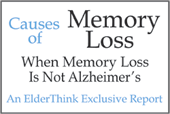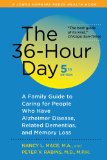
What Is Available Now To Treat Alzheimer's?
Gretchen Heuring for ElderThink
Different Treatments for Body and for Mind
Treatments for Alzheimer's Disease are broken into two categories described as cognitive and behavioral. Cognitive symptoms involve memory, language, paying attention, and judgment. Behavioral symptoms include emotional expressions like temper outbursts, suspiciousness, or withdrawal.
Diazoxide
A drug called "Diazoside" was developed decades ago to treat high blood pressure has been shown to improve learning and memory in mouse models of Alzheimer's disease, according to a new study by researchers at the National Institute on Aging. The drug improves blood flow in the brain and prevents the harmful accumulation of two proteins, beta-amyloid and tau, which are hallmarks of Alzheimer's.
Medicines that slow the progress of cognitive Symptoms
Drugs currently on the market can slow or delay Alzheimer's cognitive symptoms. These drugs all seem to lose their effectiveness over time and some are prescribed in combination. Researchers all over the world are working hard on medicines for both prevention and cure. A brief description can be found in the right column of this page for each medicine currently in use.
Behavioral symptoms require different drugs
Other drugs are prescribed for behavioral symptoms such as sleeplessness, depression and anxiety. These include Celexa, Remeron or Zoloft. Aggression can be extreme with Alzheimer's patients. Depakote, Tegretol or Trileptal are prescribed for aggression. Paranoia, hallucinations and agitation are most often treated with antipsychotic drugs such as Risperdal, Seroquel or Zyprexa.
Ongoing testing in clinical trails
According to the Alzheimer's Association, the path to effective new treatments is through clinical trials. Right now, at least 50,000 volunteers are urgently needed to participate in more than 100 actively enrolling clinical trials about Alzheimer's and related dementias. Trials are recruiting people with Alzheimer's and mild cognitive impairment (MCI), as well as healthy volunteers to be controls. Find out more about participating in a clinical study through the Alzheimer's Association TrialMatch service , a free tool for people with Alzheimer's, caregivers, families and physicians to locate clinical trials based on personal criteria (diagnosis, stage of disease) and location.





